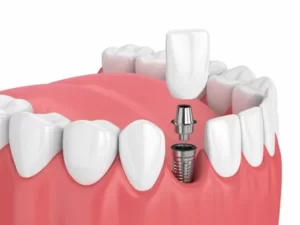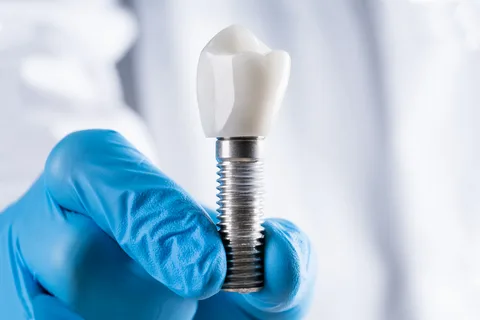If you are looking for the right dental care, you have come to the right place. In this blog post, we will cover the various options available to you for dental implants, orthodontics, crowns, bridges, mouthguards, and wisdom teeth. We will explain the differences between these treatments, when they are necessary, and how to find the best professional Dental Implant to help you with your needs. Whether you’re looking to enhance your smile, prevent future problems, or simply maintain your oral health, this blog post has the answers you need.
Dental implants
Dental implants are a great solution for those who are missing teeth. An implant consists of a small metal post that is inserted into the jawbone, and then topped with a crown that is designed to look and function just like a natural tooth.
One of the benefits of dental implants is that they are long-lasting. Unlike dentures, which may need to be replaced every few years, a dental implant can last a lifetime if it is properly cared for.
Getting a dental implant involves a surgical procedure, so it is important to choose a dentist who has experience with implant placement. You may also want to consider the cost of the procedure, as dental implants can be quite expensive. However, many people find that the investment is well worth it for the improved functionality and aesthetics of their smile.
Overall, dental implants are a great option for those who want a long-lasting solution for missing teeth. Talk to your dentist to see if you are a good candidate for this procedure.
Orthodontics
Orthodontics is a specialized field of dentistry that focuses on correcting irregularities in teeth and jaw alignment. Orthodontic treatment is typically used to improve the appearance, functionality, and health of teeth. Common orthodontic problems include overcrowding, spacing issues, overbite, underbite, and crossbite. Treatment options for orthodontic problems include braces, clear aligners, and other appliances.
Braces are the most common orthodontic treatment option. They consist of brackets, wires, and bands that are attached to the teeth and adjusted over time to gradually move the teeth into proper alignment. Braces can be made from metal, ceramic, or clear materials depending on the patient’s preference and needs.
Clear aligners are an increasingly popular alternative to braces.
These custom-made trays are worn over the teeth and are virtually invisible. They are typically more comfortable than braces and can be removed for eating, brushing, and flossing. However, they may not be suitable for all patients and can be more expensive than traditional braces.
Other orthodontic appliances include headgear, expanders, and retainers. Headgear is used to correct severe bite problems by exerting pressure on the upper jaw. Expanders are used to widen the upper jaw and create more space for teeth. Retainers are used after braces or aligner treatment to maintain the position of the teeth.
Orthodontic treatment can take anywhere from six months to several years
Depending on the severity of the problem and the chosen treatment option. Patients will typically need to visit their orthodontist every four to six weeks for adjustments.
Overall, orthodontic treatment can improve the appearance and function of your teeth, leading to better oral health and confidence. If you have concerns about your teeth or jaw alignment, talk to your dentist about whether orthodontic treatment might be right for you.
Crowns and bridges
If you have a damaged or decayed tooth, a crown can help restore it. Crowns are essentially a cap that fits over the damaged tooth, strengthening it and protecting it from further damage. They can also improve the appearance of a tooth that is discolored or misshapen. Bridges, on the other hand, are used to replace one or more missing teeth. They consist of an artificial tooth (or teeth) that is attached to neighboring teeth or dental implants. Bridges can help improve your ability to eat and speak, as well as restore the appearance of your smile.
To get the Crowns And Bridges, your dentist will first need to prepare the affected tooth (or teeth). This usually involves removing some of the outer layer of the tooth to make room for the crown or bridge. Then, they will take an impression of your teeth to create a custom-fitted crown or bridge.
In some cases
A temporary crown or bridge may be placed while the permanent one is being made. Crowns and bridges are typically made from materials like porcelain, ceramic, or metal. Your dentist can help you choose the right material for your needs and preferences. With proper care, crowns and bridges can last for many years.
It’s important to keep in mind that getting a crown or bridge is a process that may take several appointments. You’ll also need to maintain good oral hygiene to ensure the longevity of your restoration. Regular checkups with your dentist can help catch any issues early on and prevent further damage to your teeth.
Mouthguards
If you participate in sports or other activities that could potentially damage your teeth, a mouthguard is an important piece of protective equipment. A Mouthguard is a flexible device that fits over your teeth, providing a barrier between them and anything that could cause damage. They are commonly used in sports such as football, hockey, and boxing, but can also be used for activities like skateboarding or rollerblading.
Mouthguards are available in three main types: stock, boil and bite, and custom-fit. Stock mouthguards are pre-formed and come in various sizes. They are inexpensive but are not very effective as they cannot be adjusted to fit your teeth and mouth. Boil and bite mouthguards are also pre-formed, but can be softened in boiling water and then shaped to your mouth for a more customized fit. Custom-fit mouthguards are made by a dentist who takes impressions of your teeth to create a mold that is then used to create a mouthguard tailored to your specific needs.
Mouthguards should be replaced periodically
As they can become worn or damaged over time. A good rule of thumb is to replace your mouthguard every season if you participate in a sport, or every year if you use it for other activities. In summary, if you participate in any activity that puts your teeth at risk of damage, a mouthguard is an essential piece of equipment to protect your teeth.
Make sure to choose the right type of mouthguard for your needs and replace it regularly to ensure optimal protection. Your dentist can provide guidance and recommendations on the best type of mouthguard for your specific needs.
Wisdom teeth
Wisdom Teeth are the third molars that typically emerge between the ages of 17 and 25. For many people, these teeth can cause a range of dental problems and pain. This is because they often emerge partially or at odd angles, which can lead to impaction, infection, and even damage to adjacent teeth.
To avoid complications, many dentists recommend having wisdom teeth extracted. Extraction is typically performed as an outpatient procedure under local anesthesia, which means you can go home the same day. In some cases, general anesthesia may be used, especially if several teeth need to be removed at once.
If you’re experiencing pain or discomfort around your wisdom teeth
Don’t hesitate to see a dentist. They can evaluate your situation and recommend the best course of action. While extraction is the most common solution, some wisdom teeth can be left in place if they’re properly positioned and aren’t causing problems.
Remember, good dental hygiene is always important, but it’s especially crucial when you’re dealing with wisdom teeth. Brush and floss regularly, and be sure to keep up with your routine dental checkups.
By doing so
You’ll help ensure your teeth and gums remain healthy for years to come. It’s important to note that not all wisdom teeth need to be extracted, and your dentist will be able to determine the best course of action for your individual situation. In some cases, wisdom teeth may even be useful if they’re properly aligned and healthy.
If you do need to have your wisdom teeth extracted, don’t worry too much.
The procedure is routine and is performed by experienced dental professionals. After the extraction, you’ll likely experience some discomfort and swelling, but this should subside within a few days.
In the meantime, be sure to follow your dentist’s instructions for post-operative care. This may include eating soft foods, using ice packs to reduce swelling, and taking pain medication as needed. And as always, be sure to maintain good dental hygiene habits to promote healing and prevent future problems.
In summary, wisdom teeth can be a pain (literally!) for many people, but they don’t have to be. With proper dental care and attention, you can keep your teeth and gums healthy and avoid the complications that can come with impacted or infected wisdom teeth. If you’re experiencing any issues with your wisdom teeth, be sure to consult with your dentist to determine the best course of action.
Conclusion
Maintaining good dental health is essential to ensure overall well-being. Whether it’s a missing tooth or a misaligned bite, finding the right dental care can improve your quality of life. By understanding the different options available, such as dental implants, orthodontics, crowns, and bridges, you can choose the right treatment plan that suits your unique needs. Don’t forget about mouthguards, which are essential for protecting your teeth during physical activity or teeth grinding at night. And finally, wisdom teeth can cause pain and discomfort if left untreated, so it’s important to schedule regular dental check-ups to ensure that any potential issues are addressed in a timely manner. With the right dental care, you can maintain a beautiful, healthy smile for years to come.
| Other Good Articles to Read |
| skank blogs |
| unreal blogs |
| tba blogs |
| all city forums |
| dany blogs |
| the music blogs |
| key forums |
| the big blog theory |
| joe blogs |
| blogs 4 me |
| blogs emon |

